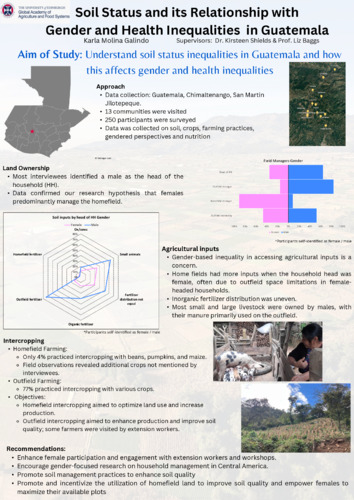Soil Status and its Relationship with Gender and Health Inequalities in Guatemala
Abstract
This research examines the relationship between soil inequalities, gender disparities, and health outcomes in Guatemala. The historical context of land concentration, limited access to land, internal conflict, and socioeconomic factors contribute to soil inequalities, which in turn affect household gender dynamics and health outcomes. Using a case study approach in San Martin Jilotepeque, Guatemala, this research examines the challenges faced by male and female farmers in managing their soil. The study employs a mixed-methods approach, including field observations, surveys and a literature review. A total of 250 surveys were conducted, gathering information on managing practices in homefield and outfield areas, as well as the gender of field managers and household heads. Preliminary findings reveal the impact of gender inequalities in land management and access to soil inputs on soil quality. Women often experience limited access to agricultural resources such as fertilizers, improved seeds, and machinery, hindering soil enhancement. This gender-based resource inequality further exacerbates existing gender disparities in agricultural productivity and household well-being. By highlighting the connection between soil and gender inequalities, this research contributes to understanding intrahousehold gender dynamics and their connection to health inequities. It aims to provide insights for addressing gender and health disparities in Guatemala. Integrated approaches that consider the multifaceted nature of these challenges are essential for sustainable development and community well-being.

